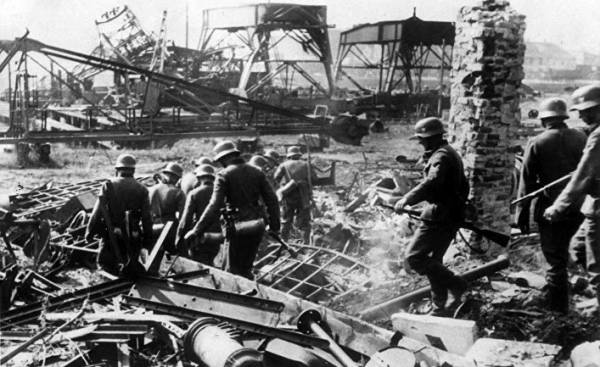
Interview with Marcin Zaremba an employee of the faculty of history of Warsaw University.
— Kultura Liberalna: When Poland began to assert its claims to reparations from Germany?
— Marcin Zaremba (Zaremba Marcin): This theme was not. Of reparations was thinking and told all the war years, it was clear that the Germans will have to pay for all the crimes and destruction. Events, however, have evolved so that our part of Europe occupied by the Red Army, Poland went to the Western and Northern territories, and reparations forgotten.
— The question of compensation Poland was at the Potsdam conference.
— Officially. But their combined compensation of the USSR, so it was initially fiction. The talks led to the Communist government, to be exact — Boleslaw Bierut (Bolesław Bierut). Real reparations were discussed. In addition, at the time Poland was most worried about the question of the Western border, where it will be held. Whether we get Tobago or not? It was a real problem.
Western lands were considered some form of reparations?
— Not mentioned directly, but it was understandable. Poland had rights to the territory that Germany annexed in 1939, and Gdansk, but not the rest of the land. She never belonged or Elblag Szczecin: while they were a vassal of Poland under Boleslav Krivosta. It was clear that this area is a kind of compensation for the Second world war, compensation for lost land in the East, as they said, “of Vilnius and Lviv”. Such language was not used, but it was implied.
— Do you know why the Polish people’s Republic refused reparations in 1953?
— This was due to the difficult economic situation in Eastern Germany. The Germans started the restoration of the cities, Moscow has had to invest a lot of money, cost is also the maintenance of the army. The East Germans just didn’t have the money. At the same time (this process began immediately after the emergence of the GDR, anti-German rhetoric began to weaken after 1948) found that East Germans is practically our allies, part of the family of socialist countries. So reparations were refused because of the economic situation of the GDR and the ideological.
— Returning to the subject later, in the 1960-1970-ies?
— The Germans took over the obligation to pay pensions to the victims of pseudomedical experiments and the poles, who fell during the war for forced labor. There is another very interesting topic: the Treaty, which was signed in 1975, Edward Gierek (Gierek Edward) and German Chancellor Helmut Schmidt (Helmut Schmidt). The Polish Communists agreed to let go in Germany 80 thousand poles of German origin, but Poland received a 2 billion 300 million marks in the form of favorable loans. From mid-1975 until 1979, permission to travel was able to obtain about 123 thousand people. It was a game Gierek and human trafficking. Later, the subject of reparations, returning almost every dispute with the German “Union of the expelled”, by Herbert Hupcey (Herbert Hupka), Herbert, CAA (Herbert Czaja) and Erika Steinbach (Erika Steinbach), but it was the informal opinion expressed by the Polish leadership. The principle was this: if they are with us so, we too will act, and make demands.
— Did the question of reparations during the discussion of the mechanism of unification of Germany (the contract “Two plus four”)?
— No, this theme was not. It did not sound before: in 1970, when Willy Brandt (Willy Brandt) and Jozef Cyrankiewicz (Józef Cyrankiewicz) signed an agreement fixing the border along the Oder and Nysa, either in 1989 or 1990, when there was a speech about the unification of Germany, and Mazowiecki (Tadeusz Mazowiecki) was in talks with Kohl.
Why?
In 1970 Warsaw considered guarantees about the Western lands as a sort of compensation, because they are secured Polish off right away. Wladyslaw Gomulka (Władysław Gomułka) understood this and believed great success.
And in today’s Poland?
— On the fore Polish fears associated with the unification of Germany, the subject of reparations, but in no way was raised. I know nothing about it. Of course, could be kept secret negotiations, but of memories Process (Krzysztof Skubiszewski) or gutted (Bronisław Geremek) nothing like it should.
— How do You feel about the fact that Warsaw raised the issue of reparations now?
— This is nonsense. I remember as a hero by Henryk Sienkiewicz Yan Zagloba sold Livonia… We are raising the subject for the development of which has no prospects, it all just empty promises.
— Do you think that the government uses anti-German discourse for its legitimization?
— Anti-German slogans was used in this way Communist propaganda in 1960-1980-ies. The tone was set with their performances Gomulka, who was fixated on the idea coming from over Poland’s Western border threats.
One can cite many examples of literature or movies has created a negative image of Germany and Germans. The theme of German threats found material embodiment in the form of ceremonies and events dedicated to the anniversaries of historical events. Anti-German campaign preceded the events of March 1968 (beginning of the anti-Semitic campaign in Poland — approx. TRANS.). It served as the legitimization of the authorities, presenting them in the way of defenders of the Fatherland, as well as the mobilization of the population in the spirit of the old slogan “Hannibal ante portas”.
Now the situation looks like. Anti-German discourse allows the Polish leadership to act as “true poles” and to divert attention from the conflict in Warsaw and the European Union. In the end we ruin our relations with our key ally, Germany. Worst of all, the power confuses ordinary citizens. Such things should not go unpunished.







